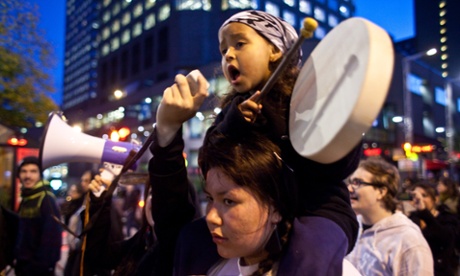Excerpts of this Guardian article have been published here. To read the entire article, click here.
But smoke and flames from police cars can only hide the truth for so long. The exact chronology is not yet settled, but this much is clear: on Thursday morning someone in government sanctioned the Canadian police to invade a peaceful protest site like an army. In a dawn raid, snipers crawled through the forest, putting children and elders in their cross-hairs. Police carried assault rifles and snarling dogs, and sprayed tear gas and shot rubber-type bullets. The result was predictable: shocked and enraged people, a day ending in chaos.
There is only one reason the police were unleashed. Not because of the New Brunswick Premier's claims about the dangers of an "armed encampment"; protestors had been unswervingly non-violent for months. Ever since 2010, when New Brunswick handed out 1.4 million hectares of land – one-seventh of the province – to shale gas exploration, opposition had been mounting. Petitions, town hall meetings, marches on legislature had slowly transformed to civil disobedience, and in October, to the blockade of equipment that Texan SNW Resources was using for seismic testing. The company was losing $60,000 daily, and the non-violent defiance had put a wrinkle in the Premier's plans for a resource boom. The blockade had to go.
Excerpt 2: "It is our responsibility to protect Mother Earth, to protect the land for non-natives too," says Susan Levi-Peters, the former Chief of Elsipogtog. "My people are speaking up for everyone." Others have heard. Since the beginning of the summer, Levi-Peters has seen indigenous Maliseet, Acadians and anglophone New Brunswickers drawn to this new epicentre of resistance on her community's traditional lands. "People care about the water. People care about the environment. This isn't just a native issue."
But let's be clear about one way this is a "native issue": the rush underway for dirtier and more extreme fossil fuels and minerals, in New Brunswick and across Canada, is just the latest stage of colonial pillage. It's a badly-kept secret that Canada's oil, gas and mineral wealth, the key to Prime Minister Stephen Harper's reckless resource obsession, are mostly on Indigenous lands. And if industry is to have them, the country's national myths must be summoned. In last week's Speech from the Throne, Harper praised the "courage and audacity" of the country's "pioneers," who "forged an independent country where non would have otherwise existed." A day later, the raid on Elsipogtog was effectively a footnote.
Excerpt 3: Freed of the distractions, we will be left with a single question. Do we obey provincial dictates that grant a company license to pollute the water? Or the laws of Indigenous peoples, of the Supreme Court, and of our conscience, calling us to protect it? The answer will tell us everything about the kind of country we will have.
To read the entire article, click here.
-submitted by Gareth

Surely this is one issue that our science, common sense, and conscience can all agree on. I don't know how we can be so desperate to rape our country of one resource at the cost of so much long term destruction. Unfortunately one negative response paints all those who protest with the same brush and once again the true message gets lost in sensationalism, a tactic we have all come to expect from the powers that be. Peaceful protest must continue if we as a people are to have any chance of protecting the environment for the future.
ReplyDelete